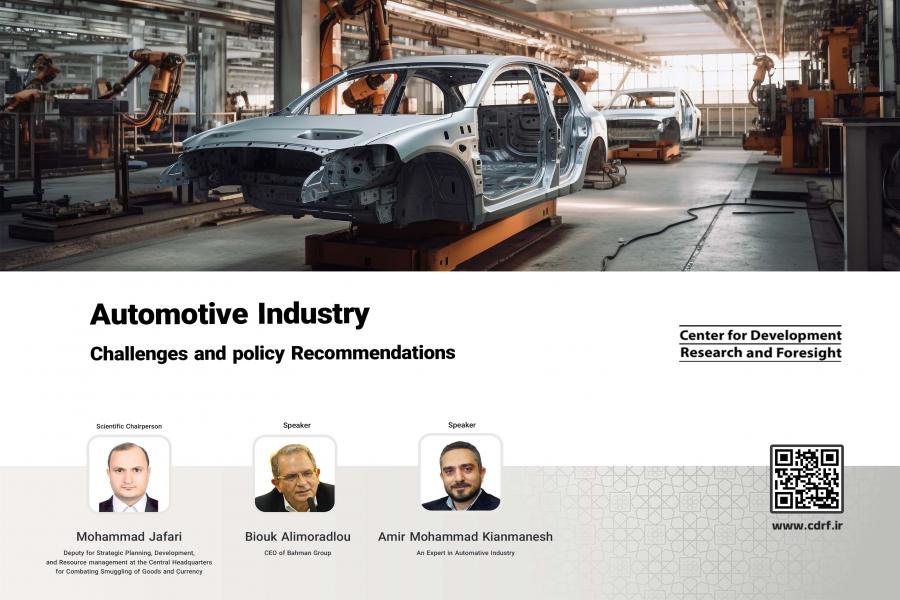
-
بررسی آییننامهها و دستورالعملهای برنامه هفتم پیشرفت
-
بررسی عوامل موثر بر افزایش تصادفات و تلفات جادهای و سوانح رانندگی و دادهکاوی تلفات انسانی
-
سازماندهی و بازآرایی فضایی آموزش عالی کشور
-
به روز رسانی سند ملی آمایش سرزمین
-
انجام مطالعات مناطق آزاد به عنوان نواحی پیشران اقتصادی کشور
-
اصلاح ساختار بودجه و پیاده سازی نظام یکپارچه مدیریت اطلاعات مالی دولت (IFMIS)

The recent conference at the Center for Development Research and Foresight, titled "Automotive Industry: Challenges and Policy Recommendations," was held with the participation of notable figures. These included Mohammad Jafari, Deputy for Strategic Planning, Development, and Resource Management of the Central Headquarters for Combating Smuggling of Goods and Currency; Biouk Alimoradlou, CEO of Bahman Group; and Amir Mohammad Kian Manesh, an expert in the automotive industry.
Jafari, as the scientific chairperson, opened the conference with a historical overview. He traced the industry's roots back to 1957 and the establishment of Jeep in Iran, highlighting early successes such as the iconic Paykan car produced by Iran Khodro in 1966. However, he also pointed to challenges that emerged in the 1980s, including the Iran-Iraq War and the imposition of international sanctions, which hampered growth and investment.
Alimoradlou, CEO of Bahman Group, the first speaker, underscored the global significance of the automotive industry, emphasizing its role in employment, economic growth, and technological advancement. He compared Iran's car production capacity of 2.2 million units per year to the actual demand of one million units, raising questions about the industry's efficiency and utilization. He identified several key challenges hindering progress, including a lack of investment in research and development, government control and pricing policies, and the dominance of "harmful factors" such as outdated technology and inefficient management. Alimoradlou advocated for solutions such as reducing government intervention, promoting transparency, and embracing joint ventures with foreign manufacturers to acquire new technology and improve quality.
Following Alimoradlou, Kian Manesh shed light on the practical challenges faced by car manufacturers. He emphasized the impact of sanctions on the industry's ability to import essential parts, often sourced from China. The inconsistent supply of currency from the government further hampered production, causing delays and hindering manufacturers from meeting their targets. Kian Manesh also highlighted the car pricing issue, criticizing the current system's reliance on outdated cost data and its inability to account for sharp fluctuations in exchange rates, putting undue pressure on manufacturers. He called for a more dynamic and transparent pricing mechanism that reflects the true cost of production.
Despite the challenges, the conference also acknowledged the growing role of private car manufacturers in Iran. Kian Manesh pointed to Modiran Khodro, which surpassed Iran Khodro in production volume in the first half of 2023, as a prime example of this trend. He continued: "The private sector's impressive growth rate of 185% in the first seven months of 2023 compared to the same period in 2021 suggests that private manufacturers could be a driving force in the industry's future."
The conference concluded with a call for collective action to revitalize Iran's car industry. The experts emphasized the need for a multi-pronged approach that addresses issues like government intervention, currency fluctuations, outdated technology, and pricing inefficiencies. They also stressed the importance of collaboration between the government, private sector, and foreign partners to leverage technology, attract investment, and boost production.



